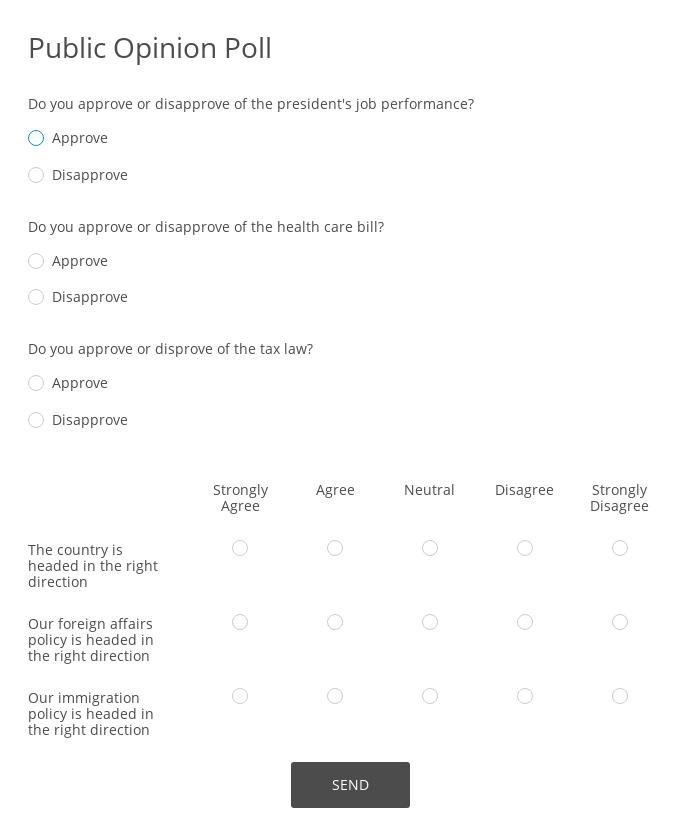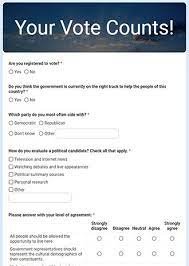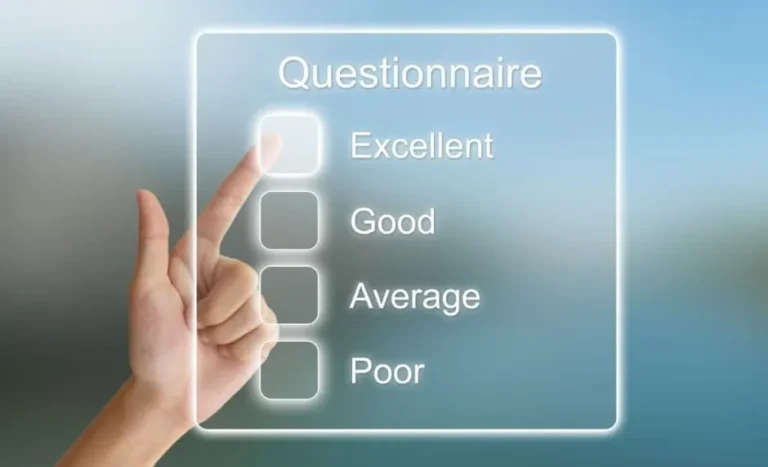Understanding public sentiment on political issues is crucial for candidates, policymakers, and researchers alike.
Try out political survey questions, the tools used to gauge public opinion on a range of topics, from voting intentions to specific policies.
This guide explores the different types of political survey questions, their uses, and how to create effective surveys for your needs.
Table of contents
- What are Political Survey Questions?
- Why give out political surveys?
- How to Create a Political Survey Questionnaire:
- 50+ Political Survey Questions
- Political Survey Questions Examples and Sample Answers
- Good Political Survey Questions and Sample Answers
- Top Political Survey Questions and Sample Answers
- Questionnaire Political Survey Questions and Sample Answers
- Cell phone political survey questions and sample Answers
- Sample political survey questions and sample Answers
- Political Participation Survey Questions and Sample Answers
- Political Survey Questions to ask Affiliates and sample Answers
- Political Survey Questions to Ask Politicians and Sample Answers
- Political Ideology Survey Questions and Sample Answers
- Political Awareness and Political Knowledge Survey Questions and Sample Answers
- Survey Questions and Sample Answers on Political Effectiveness
- Political Survey Questions Templates
- Tips for using political surveys
- Related FAQs
- Conclusion
- References
- Recommendations
What are Political Survey Questions?
Political survey questions are research questions designed to gather data about individuals’ opinions, beliefs, and attitudes on political issues, candidates, and parties. They delve into various aspects of political engagement, including:
- Voting behavior and intentions
- Views on specific policies and legislation
- Trust in political institutions and figures
- Party affiliation and political ideology
- Awareness of current events and political debates
Political survey questions can be administered in various formats, including:
- Online surveys
- Phone surveys
- In-person surveys
- Mail surveys
The choice of format depends on factors like target audience, budget, and desired level of data accuracy.
Six Types of Political Survey Questions
1. Demographic questions: Gather basic information like age, gender, income, and education to understand the composition of your sample.
2. Attitudinal questions: Gauge opinions and beliefs on specific issues using scaled questions (e.g., “Strongly agree” to “Strongly disagree”) or open-ended prompts.
3. Behavioral questions: Explore past or future voting behavior, political engagement (e.g., volunteering, attending rallies), and media consumption habits.
4. Knowledge-based questions: Assess awareness of political events, candidates, and policies.
5. Value-based questions: Uncover underlying values and motivations behind political beliefs.
6. Hypothetical questions: Explore how respondents would react to different policy scenarios or candidate actions.
Related Post: 30+ HCAHPS Survey Questions to ask your Patient
Why give out political surveys?
Political survey questions serve various purposes, including:
- Campaign strategy: Identifying potential voters, understanding issues of concern, and tailoring messages accordingly.
- Policy development: Informing policy decisions by gauging public support for different options.
- Academic research: Studying political trends, voter behaviour, and the influence of various factors on political opinions.
- Media reporting: Providing insights into public opinion on current events and shaping the narrative.
How to Create a Political Survey Questionnaire:
1. Define your target audience: Who are you trying to reach with your survey?
2. Identify your research objectives: What specific information do you want to collect?
3. Choose the right question types: Select question formats that align with your objectives and target audience.
4. Ensure clear and concise wording: Avoid ambiguity and bias in your questions.
5. Pilot test your survey: Gather feedback before launching your full survey.
6. Choose the right survey platform: Consider online tools, phone surveys, or in-person interviews depending on your resources and target audience.
50+ Political Survey Questions
Political Survey Questions Examples and Sample Answers
1. Do you support increasing taxes on the wealthiest individuals and corporations to fund social programs?
· Yes, taxing the wealthy more fairly will help address income inequality.
· No, higher taxes on the wealthy will stifle economic growth and job creation.
2. Should the government prioritize diplomacy over military intervention in resolving international conflicts?
· Yes, diplomacy should always be the first approach to resolving conflicts.
· No, sometimes military intervention is necessary to protect national interests.
3. Do you believe healthcare should be a fundamental right guaranteed by the government?
· Yes, access to healthcare is a basic human right and should be provided for all citizens.
· No, healthcare is a personal responsibility, not the government’s obligation.
4. Do you support stricter regulations on carbon emissions to combat climate change?
· Yes, urgent action is needed to address the climate crisis and protect the planet.
· No, excessive regulations will hurt businesses and hinder economic growth.
5. Should the government provide free public education, including college tuition?
· Yes, investing in education is essential for societal advancement and economic mobility.
· No, individuals should be responsible for covering their education expenses.
Good Political Survey Questions and Sample Answers
6. Do you support expanding social welfare programs such as food stamps and unemployment benefits?
· Yes, these programs provide crucial support to vulnerable populations during times of need.
· No, expanding welfare programs encourages dependency and is unsustainable.
7. Should there be reforms to reduce mass incarceration and address racial disparities in the criminal justice system?
· Yes, reforms are necessary to promote fairness and equality within the criminal justice system.
· No, maintaining tough-on-crime policies is essential for public safety.
Top Political Survey Questions and Sample Answers
8. Do you believe in providing a pathway to citizenship for undocumented immigrants living in the country?
· Yes, offering a pathway to citizenship is humane and benefits both immigrants and society.
· No, undocumented immigrants should be deported as they are breaking the law.
9. Do you support stricter gun control measures, such as universal background checks and assault weapons bans?
· Yes, tighter gun control laws are necessary to reduce gun violence and keep communities safe.
· No, gun ownership is a constitutional right, and additional restrictions infringe upon that right.
Related Post: 250+ Best Simpsons Trivia Questions and Answers (Easiest to Hardest)
Questionnaire Political Survey Questions and Sample Answers
10. Do you support laws protecting LGBTQ+ individuals from discrimination in employment, housing, and public accommodations?
· Yes, LGBTQ+ individuals deserve equal rights and protections under the law.
· No, such laws infringe upon religious freedom and personal beliefs.
11. Should there be reforms to the electoral system, such as ranked-choice voting or abolishing the Electoral College?
· Yes, electoral reforms would enhance democracy and ensure fair representation.
· No, the current electoral system is effective and should not be changed.
12. Do you believe in increasing transparency in government operations, including making political donations and lobbying activities more accessible to the public?
· Yes, transparency is essential for holding elected officials accountable and maintaining trust in government.
· No, certain aspects of government operations should remain confidential for national security reasons.
13. Should affirmative action policies be implemented to address historical discrimination and promote diversity in education and employment?
· Yes, affirmative action is necessary to level the playing field for marginalized groups and promote diversity.
· No, affirmative action discriminates against individuals based on their race or gender and is unfair.
14. Do you support reducing government spending to lower the national debt and deficit?
· Yes, reducing government spending is crucial for fiscal responsibility and long-term economic stability.
· No, cutting spending could harm essential services and hinder economic growth.
15. Should the government prioritize protectionist policies to safeguard domestic industries, or advocate for free trade agreements to promote global commerce?
· Yes, protectionist policies are necessary to protect domestic jobs and industries from unfair competition.
· No, free trade agreements benefit consumers by providing access to a wider variety of goods at lower prices.
16. Do you support increasing surveillance measures to enhance national security and prevent terrorism?
· Yes, ensuring national security is paramount, even if it means sacrificing some privacy rights.
· No, excessive surveillance infringes upon civil liberties and undermines democratic values.
17. Should the government reform Social Security to ensure its long-term sustainability, such as raising the retirement age or adjusting benefits?
· Yes, reforms are necessary to prevent Social Security from running out of funds and failing future generations.
· No, Social Security should remain unchanged, and alternative solutions should be explored.
18. Do you support a single-payer healthcare system, where the government provides healthcare coverage for all citizens?
· Yes, a single-payer system would ensure universal access to healthcare and reduce administrative costs.
· No, a single-payer system would lead to decreased quality of care and long wait times for medical services.
19. Should education funding be increased, particularly in low-income areas, to improve educational outcomes and reduce disparities?
· Yes, investing in education is crucial for fostering equality of opportunity and promoting social mobility.
· No, increasing funding alone will not necessarily improve educational outcomes, and alternative solutions should be considered.
20. Do you support investing in renewable energy sources and implementing policies to reduce carbon emissions to combat climate change?
· Yes, addressing climate change is one of the most pressing challenges of our time, and decisive action is needed.
· No, the economic costs of transitioning to renewable energy outweigh the benefits, and other priorities should take precedence.
21. Should voting rights be expanded, such as implementing automatic voter registration and restoring voting rights to felons who have completed their sentences?
· Yes, expanding voting rights strengthens democracy and ensures that all eligible citizens can participate in the electoral process.
· No, voting rights should not be extended to individuals who have committed felonies, and voter registration should remain an individual responsibility.
22. Do you support increased regulation of large corporations to prevent monopolies, ensure consumer protection, and promote fair competition?
· Yes, stronger regulations are necessary to hold corporations accountable and prevent them from exploiting consumers and workers.
· No, excessive regulation stifles innovation and hinders economic growth, and market forces should be allowed to regulate corporations.
23. Should there be stricter ethical standards and transparency requirements for elected officials and government employees?
· Yes, maintaining high ethical standards is essential for restoring public trust in government and preventing corruption.
· No, existing ethics rules are sufficient, and additional regulations would create unnecessary bureaucracy.
24. Do you support increased government investment in infrastructure projects, such as roads, bridges, and public transportation?
· Yes, investing in infrastructure creates jobs, stimulates economic growth, and improves the quality of life for citizens.
· No, infrastructure projects should be funded by the private sector, and government spending should be reduced.
25. Should the government implement policies to address the affordable housing crisis, such as rent control and subsidies for low-income housing?
· Yes, affordable housing is a basic necessity, and government intervention is needed to ensure that everyone has access to safe and affordable housing.
· No, market forces should determine housing prices, and government intervention would distort the housing market and discourage investment.
26. Do you support legalizing or decriminalizing certain drugs, such as marijuana, to reduce incarceration rates and redirect resources to addiction treatment?
· Yes, the War on Drugs has failed, and alternative approaches, such as legalization and harm reduction, are needed to address drug addiction and reduce criminalization.
· No, drug legalization sends the wrong message and would increase drug abuse and addiction rates.
27. Should the government implement policies to promote economic development and job creation in rural areas?
· Yes, rural communities deserve investment and support to thrive economically and socially.
· No, rural development should be driven by market forces, and government intervention would distort the economy.
28. Do you support regulating big tech companies to address concerns about privacy, data security, and monopolistic behaviour?
· Yes, tech companies have too much power and influence, and regulation is necessary to protect consumers and ensure fair competition.
· No, government intervention in the tech industry stifles innovation and hampers economic growth.
Cell phone political survey questions and sample Answers
1. How likely are you to vote in the upcoming election?
· Very likely
· Somewhat likely
· Not likely
2. On a scale of 1 to 10, how informed do you feel about current political issues?
· 1 (not informed at all)
· 5 (somewhat informed)
· 10 (extremely informed)
3. Do you prefer to receive political news and updates through text messages or social media?
· Text messages
· Social media
· Other (please specify)
4. Have you ever participated in a political campaign or volunteered for a political cause?
· Yes
· No
5. How frequently do you engage in political discussions with friends and family?
· Daily
· Weekly
· Rarely
6. How do you feel about the role of technology in modern politics, such as online voting or digital campaigning? – It’s a positive advancement – It’s concerning and could lead to issues – I’m neutral on this matter
7. Would you be willing to participate in political focus groups or surveys via your cell phone in the future? – Yes – No – Unsure
8. How much influence do you believe social media platforms have on shaping political opinions? – A significant amount – A moderate amount – Very little to none
9. Do you think there should be stricter regulations on political advertising on social media? – Yes – No – Unsure
10. How likely are you to share political content on your social media accounts? – Very likely – Somewhat likely – Not likely
Related Post: 250+ Best SpongeBob Trivia Questions and Answers (Easiest to Hardest)
Sample political survey questions and sample Answers
1. What is your opinion on the current state of healthcare in the country?
· It needs significant reform
· It’s satisfactory
· It’s excellent as it is
2. How do you feel about the government’s handling of the economy?
· Approve
· Disapprove
· Neutral
3. What is your stance on immigration policies?
· Support stricter policies
· Support more lenient policies
· Neutral
4. Do you believe climate change is primarily caused by human activity?
· Yes
· No
· Unsure
5. Should there be stricter gun control laws? – Yes – No – Unsure
6. In your opinion, what are the most pressing issues facing our country today? (Select up to three) – Economic inequality – Healthcare reform – Climate change – Immigration – National security – Education – Other (please specify)
7. How do you rate the government’s response to the COVID-19 pandemic? – Excellent – Good – Fair – Poor – Very Poor
8. Do you support the idea of universal basic income (UBI)? – Yes – No – Unsure
9. How much do you trust the mainstream media as a reliable source of political information? – Completely trust – Somewhat trust – Do not trust at all
10. Do you believe that the current political system adequately represents the interests of all citizens? – Yes – No – Unsure
Political Participation Survey Questions and Sample Answers
1. Have you ever attended a political rally or protest? – Yes – No
2. How often do you contact your elected representatives to voice your opinion on political issues? – Regularly – Occasionally – Rarely
3. Have you ever donated money to a political campaign? – Yes – No
4. Have you ever run for political office or considered doing so? – Yes – No
5. How likely are you to participate in local government meetings or town halls? – Very likely – Somewhat likely – Not likely
6. Have you ever participated in a political fundraising event? – Yes – No
7. How often do you sign petitions related to political or social causes? – Frequently – Occasionally – Rarely
8. Have you ever worked for a political campaign as a paid staff member? – Yes – No
9. Do you regularly attend meetings of local political organizations or clubs? – Yes – No
10. Have you ever been a delegate to a political party convention? – Yes – No
11. How likely are you to participate in local government meetings or town halls? – Very likely – Somewhat likely – Not likely
Political Survey Questions to ask Affiliates and sample Answers
1. Which political party do you affiliate with? – Democratic – Republican – Independent – Other (please specify)
2. How strongly do you identify with your political party? – Very strongly – Somewhat strongly – Not strongly at all
3. What is the main reason you support your chosen political party? – Their stance on social issues – Their economic policies – Their leadership and values
4. Have you ever voted for a candidate from a different political party than your own? – Yes – No
5. Do you believe that bipartisan cooperation is important for effective governance? – Yes – No – Unsure
6. How do you feel about the current state of the healthcare system in relation to your political party’s policies? – Satisfied – Dissatisfied – Neutral
7. What do you think are the strengths of your political party’s platform? – Economic policies – Social justice initiatives – Foreign policy – Other (please specify)
8. How do you think your political party can improve its appeal to a wider range of voters? – Emphasizing certain policies – Changing messaging strategies – Reaching out to different demographics
9. Do you believe your political party adequately addresses the concerns of minority communities? – Yes – No – Unsure
10. How do you perceive the level of unity within your political party? – Very united – Somewhat united – Divided
Related Post: 200+ Employee Survey Questions About Management to Improve Workplace Leadership
Political Survey Questions to Ask Politicians and Sample Answers
11. What is your stance on immigration reform, and how do you plan to address it if elected?
Sample Answer: “I believe in comprehensive immigration reform that prioritizes border security while offering a pathway to citizenship for undocumented immigrants already living in the country.”
12. How do you plan to tackle climate change and promote renewable energy in our region?
Sample Answer: “I advocate for investing in green infrastructure and transitioning to renewable energy sources to combat climate change and create sustainable jobs.”
13. What measures do you propose to address income inequality and promote economic equity?
Sample Answer: “I support raising the minimum wage, implementing progressive taxation, and expanding access to education and healthcare to reduce income inequality.”
14. What is your stance on healthcare reform, and how do you propose to improve access to affordable healthcare?
Sample Answer: “I believe in expanding healthcare coverage and lowering prescription drug costs through measures like a public option and negotiating drug prices.”
15. How do you plan to address systemic racism and promote social justice in our society?
Sample Answer: “I support criminal justice reform, police accountability measures, and investments in communities disproportionately affected by systemic racism.”
16. What steps will you take to protect and promote LGBTQ+ rights?
Sample Answer: “I am committed to passing legislation that bans discrimination based on sexual orientation and gender identity and ensures equal rights for all individuals.”
Political Ideology Survey Questions and Sample Answers
17. What is your position on abortion rights and reproductive healthcare access?
Sample Answer: “I believe in a woman’s right to choose and advocate for access to safe and affordable reproductive healthcare services.”
18. How do you view the role of government in addressing social issues such as poverty and homelessness?
Sample Answer: “I believe the government has a responsibility to provide social safety nets and invest in programs that lift people out of poverty and homelessness.”
19. What is your opinion on free trade agreements and their impact on the economy?
Sample Answer: “I support fair trade agreements that protect workers’ rights and environmental standards while promoting economic growth and international cooperation.”
20. Do you identify as conservative, liberal, moderate, or another political ideology?
Sample Answer: “I identify as a progressive, championing social justice and economic equality.”
21. What are your views on gun control legislation and the Second Amendment?
Sample Answer: “I believe in common-sense gun control measures to ensure public safety while respecting individuals’ rights under the Second Amendment.”
22. How do you feel about government intervention in the economy?
Sample Answer: “I believe in a mixed economy where the government plays a role in regulating industries to prevent exploitation and promote fairness.”
Political Awareness and Political Knowledge Survey Questions and Sample Answers
23. Can you name the current leaders of our neighbouring countries?
Sample Answer: “Yes, the current leaders of our neighbouring countries are [Names].”
24. What is the primary responsibility of the Supreme Court in the United States?
Sample Answer: “The primary responsibility of the Supreme Court is to interpret the Constitution and ensure that laws align with its principles.”
25. How does the electoral college system work in presidential elections?
Sample Answer: “The electoral college system allocates electoral votes to each state based on its representation in Congress, and the candidate who wins a majority of electoral votes becomes the president.”
26. Can you name the current members of the president’s cabinet?
Sample Answer: “Yes, the current members of the president’s cabinet include [Names].”
27. How does the United States Congress function, and what role do senators and representatives play?
Sample Answer: “The U.S. Congress is the legislative branch of government, consisting of the Senate and the House of Representatives. Senators and representatives draft, debate, and vote on legislation.”
28. What are the main differences between a democracy and a dictatorship?
Sample Answer: “In a democracy, power is vested in the people, who elect representatives to govern on their behalf, while in a dictatorship, power is concentrated in the hands of a single ruler or ruling party.”
Survey Questions and Sample Answers on Political Effectiveness
29. How will you ensure transparency and accountability in your administration?
Sample Answer: “I will prioritize transparency by regularly communicating with constituents, holding open meetings, and disclosing financial information.”
30. What strategies do you have for engaging with marginalized communities and amplifying their voices in policymaking?
Sample Answer: “I plan to establish advisory councils and community forums to ensure that marginalized communities have a seat at the table and are actively involved in decision-making processes.”
31. How do you plan to address political polarization and promote unity among diverse groups?
Sample Answer: “I will strive to bridge divides by fostering respectful dialogue, seeking common ground on key issues, and promoting empathy and understanding among constituents.”
32. What experience or qualifications do you possess that make you an effective political leader?
Sample Answer: “I have served as a city council member for ten years, where I successfully implemented policies to improve infrastructure and promote economic development.”
33. How do you plan to collaborate with opposing parties to achieve bipartisan solutions?
Sample Answer: “I believe in finding common ground and working across party lines to address key issues facing our community, such as education and healthcare.”
34. What metrics will you use to evaluate the success of your policies and initiatives?
Sample Answer: “I will assess the impact of my policies through data analysis, public feedback, and regular reviews to ensure they effectively address the needs of our constituents.”
Related Post: 250+ Best Music Trivia Questions and Answers (Easiest to Hardest)
Political Survey Questions Templates



Tips for using political surveys
- Maintain ethical practices: Ensure informed consent, anonymity, and data security.
- Be transparent about your methodology: Explain how your survey was conducted and who funded it.
- Weight your results: Adjust your data to represent the actual population demographics.
- Avoid leading questions: Questions shouldn’t influence respondents towards a specific answer.
- Analyze your data carefully: Look beyond just the numbers and identify trends and patterns.
Related FAQs
general or yes/no questions, questions using wh-words, choice questions, and disjunctive or tag/tail questions
how, why, who, when, and what
Write an introduction with the assumption that respondents don’t know much, if anything, about the topic of your survey
Conclusion
Political survey questions are powerful tools for understanding public opinion in a complex and often polarized world. By using them effectively and responsibly, you can gain valuable insights into the thoughts, feelings, and motivations of your target audience, informing your campaigns, policies, or research endeavors. The key lies in asking the right questions, collecting accurate data, and analyzing your findings with an open mind.
References
- questionpro.com/ -Political Survey Questions: Top for Questionnaires
- surveysparrow.com/ -Political Survey Questions
- forms.app/ -Political survey questions for your next survey
- surveymonkey.com/ -Create Political Surveys, Polls, and Questionnaires
Recommendations
- How to Create Matrix Survey Questions | Types, Benefits and Weaknesses
- 50+ Best DEI Survey Questions to Ask in a Questionnaire
- 70+ Post Event Survey Questions You Should Ask After Your Next Event.
- 120+ Internal Communication Survey Questions With Template
- Race and Ethnicity Survey Questions | Top 3 Ways to Ask in a Questionaire





